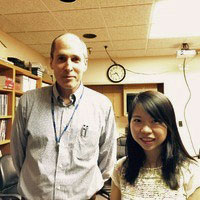“Every blossom exhibits an exquisite disorder of ragged petals finer than lace. But one needs a lens to judge of their beauty: it lies hidden from the power of our eyes, and menyanthes must have bloomed and passed a million times before there came any to perceive and salute her loveliness. The universe is full of magical things, patiently waiting for our wits to grow sharper.” –Eden Phillpotts, A Shadow Passes (1918)
In this quotation, the English writer Eden Phillpotts describes how the beauty of a flower (Menyanthes trifoliata) is enhanced when he sees its petals in greater detail with the help of a magnifying glass.

To me, this quote describes the essence of science. As I graduate with my Ph.D. and head back to medical school, I’ve been contemplating the numerous lessons I’ve learned during the course of my studies: how to ask the right scientific questions, how to design and execute experiments, how to write computer scripts for data analysis, how to troubleshoot problems, how to work in an international team of collaborators and how to communicate your data to your colleagues.
Yet, in my view, an equally valuable lesson has been learning not to lose sight of the joys of science when facing daily challenges. I am a scientist because I am curious about how biology works. I love the thrill of discovery and knowing that, for a brief moment, I may be the only one in the world holding that particular missing piece to one of life’s many puzzles.
Unfortunately, daily scientific life makes it easy to forget this. My scientific reality is that most “thrills” last only until I’ve figured out the right experimental control or found the bug in the code. It is finishing a plate of 96 reactions at 2 a.m. and having a nagging feeling that some little detail went wrong. It is many months of doing the same repetitive experiment for a single sentence of a manuscript, not to mention those unceremonious failures that remain buried in my lab notebook. It is facing rejection from scientific journals, and it is surviving amid the funding woes that plague today’s scientists. According to analysis from the Federation of American Societies for Experimental Biology, the inflation-adjusted National Institutes of Health budget has dropped by 21 percent since 2003, and success rates for R01-equivalent research grants have dropped by 38 percent.
With these daily stressors, this lesson is sometimes difficult to remember. Yet it is also the one I will need to remember most readily as I progress in science. There are indeed many “magical things” in our world that still remain for us to discover. But we will discover them only if we remain curious, persevere, learn from rejection, and continue to seek out new and exciting scientific challenges.